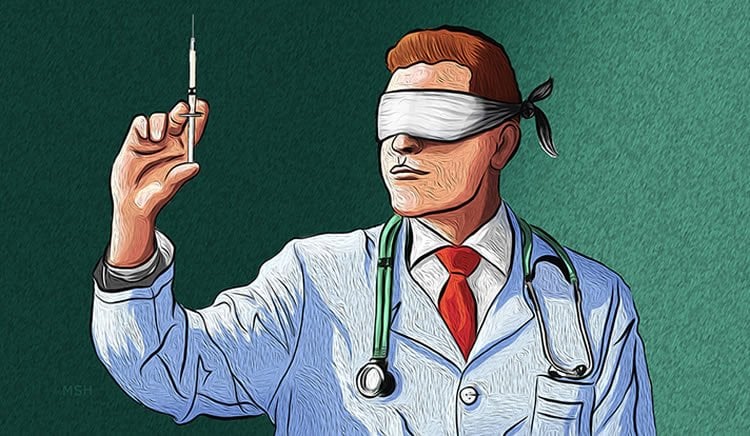Summary: A new study reports research into the term of use of ketamine to treat depression is limited.
Source: Yale.
Recent studies have confirmed observations made by Yale clinicians decades ago — the anesthetic ketamine provides rapid and robust relief to those suffering from the most severe forms of depression. However, there is also limited research to advise doctors on best doses and length of ketamine treatment, which patients will most benefit from treatment, and whether ketamine can provide long-lasting relief for depression without dangerous side effects, according to a report published March 1 in the Journal JAMA Psychiatry.
The lack of research has put doctors in a difficult position, note the researchers, as more patients are asking for treatment with ketamine, which has not been approved for use for treatment of depression and has been abused as street drug called “Special K.”
“In a nutshell, I feel confident telling patients who have had little help from previous treatments that ketamine provides meaningful relief from some of their worst symptoms for at least a few days or even weeks,’’ said Dr. Gerard Sanacora, professor of psychiatry and director of the Yale Depression Research Program and primary author of the JAMA report. “But I can’t tell them with any degree of certainty how long the benefit can be sustained or how safe it is to repeatedly administer the medication over periods of months or years.”
The original link between ketamine and relief of depression was made in New Haven by John Krystal, chair of the Department of Psychiatry at Yale, and Dennis Charney, now dean of Mt. Sinai School of Medicine, who helped launch small-scale clinical trials of ketamine while at the National Institute of Mental Health.
Pharmaceutical companies are unlikely ever to pay for costly long-term studies because ketamine has been approved for use as an anesthetic for over 45 years and carries no patent protection. However, the American Psychiatric Association Council of Research Task Force on Novel Biomarkers and Treatments asked Sanacora and other medical experts to provide a consensus statement on the benefits and the risks of ketamine treatment because “off label” prescriptions for the depression have grown dramatically in recent years.
Multiple small-scale studies have all shown similar results — that infusion of ketamine can provide rapid and robust, if transient, relief for treatment-resistant depression. But the new report emphasizes many potential downsides and risks that need to be considered when considering the treatment option.
For instance, the safest and best treatment regimens have not been established, nor is it clear which patients might benefit the most from treatment. There are occasionally cardiovascular and behavioral reactions to treatment, but the standardized monitoring protocols have yet to be developed. It is also unclear whether long-term use of the treatment might lead to increased risk of substance abuse for some patients. For these reasons, doctors who administer the drug should undergo proper training, the experts said.

“While the treatment does offer tremendous promise, patients considering ketamine treatment for their mood disorder should be well informed of both the potential benefits and the risks associated with the drug, and should be aware of the limits of the field’s existing knowledge related to the longer-term effectiveness and safety,” Sanacora said.
Source: Bill Hathaway – Yale
Image Source: NeuroscienceNews.com image is credited to Michael S. Helfenbein.
Original Research: Abstract for “A Consensus Statement on the Use of Ketamine in the Treatment of Mood Disorders” by Gerard Sanacora, MD, PhD; Mark A. Frye, MD; William McDonald, MD; Sanjay J. Mathew, MD; Mason S. Turner, MD; Alan F. Schatzberg, MD; Paul Summergrad, MD; Charles B. Nemeroff, MD, PhD; for the American Psychiatric Association (APA) Council of Research Task Force on Novel Biomarkers and Treatments in JAMA Psychiatry. Published online March 1 2027 doi:10.1001/jamapsychiatry.2017.0080
[cbtabs][cbtab title=”MLA”]Yale “Ketamine Eases Severe Depression, But Questions of Dosage and Duration Remain.” NeuroscienceNews. NeuroscienceNews, 2 March 2027.
<https://neurosciencenews.com/ketamine-depression-dosage-6185/>.[/cbtab][cbtab title=”APA”]Yale (2027, March 2). Ketamine Eases Severe Depression, But Questions of Dosage and Duration Remain. NeuroscienceNew. Retrieved March 2, 2027 from https://neurosciencenews.com/ketamine-depression-dosage-6185/[/cbtab][cbtab title=”Chicago”]Yale “Ketamine Eases Severe Depression, But Questions of Dosage and Duration Remain.” https://neurosciencenews.com/ketamine-depression-dosage-6185/ (accessed March 2, 2027).[/cbtab][/cbtabs]
Abstract
A Consensus Statement on the Use of Ketamine in the Treatment of Mood Disorders
Importance Several studies now provide evidence of ketamine hydrochloride’s ability to produce rapid and robust antidepressant effects in patients with mood and anxiety disorders that were previously resistant to treatment. Despite the relatively small sample sizes, lack of longer-term data on efficacy, and limited data on safety provided by these studies, they have led to increased use of ketamine as an off-label treatment for mood and other psychiatric disorders.
Observations This review and consensus statement provides a general overview of the data on the use of ketamine for the treatment of mood disorders and highlights the limitations of the existing knowledge. While ketamine may be beneficial to some patients with mood disorders, it is important to consider the limitations of the available data and the potential risk associated with the drug when considering the treatment option.
Conclusions and Relevance The suggestions provided are intended to facilitate clinical decision making and encourage an evidence-based approach to using ketamine in the treatment of psychiatric disorders considering the limited information that is currently available. This article provides information on potentially important issues related to the off-label treatment approach that should be considered to help ensure patient safety.
“A Consensus Statement on the Use of Ketamine in the Treatment of Mood Disorders” by Gerard Sanacora, MD, PhD; Mark A. Frye, MD; William McDonald, MD; Sanjay J. Mathew, MD; Mason S. Turner, MD; Alan F. Schatzberg, MD; Paul Summergrad, MD; Charles B. Nemeroff, MD, PhD; for the American Psychiatric Association (APA) Council of Research Task Force on Novel Biomarkers and Treatments in JAMA Psychiatry. Published online March 1 2027 doi:10.1001/jamapsychiatry.2017.0080






